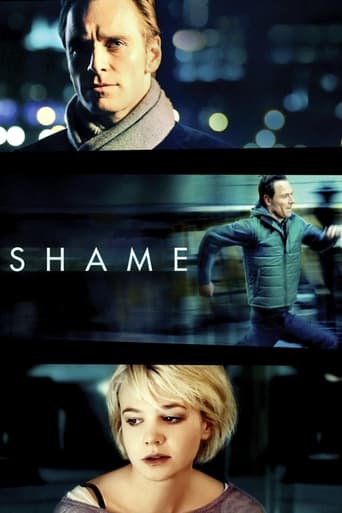hrkepler
'Shame' is a sad movie that at the end doesn't give much hope. It raises some questions and it doesn't do it subtly. Everything it wants to tell us is perfectly shown on the surface. It is not meant to be very deep movie in that department, but it is thoughtful. Porn (and sex) addiction is much bigger problem than mainstream likes to acknowledge. It leads into depression and degradation of social behavior. Michael Fassbender's portrayal of Brandon fighting with it's inner demons, that cause him quite few shameful moments, is pleasantly calm and striking. His dysfunctional relationship with his sister Sissy (equally great performance by Carey Mulligan) is almost tragic. Two damaged people who need help, but don't know how to support each other. Unresponsible Sissy who can barely manage herself, and Brandon who's unable to let go of his addictions.'Shame' is very bleak view of someone's life spiraling down while they are perfectly aware of it, but in the end they do very little to escape.
SlyGuy21
Tackling a subject as dark and grim as porn addiction can be extremely difficult. You risk delving into just straight up porn, to completely alienating your audience because of the extreme subject matter. This does it pretty damn well though. Fassbender does a really good job as this silent, suave, lady's man who really has a dark side he's ashamed of. Similar to a Patrick Bateman like character, a person who puts on a facade in order to keep up appearances, but on the inside is way more twisted. It does the subject justice, it's not just sex for the sake of having sex, and I respect that. It shows that addiction doesn't just affect the person doing it, but the people around them too. It's a drug, and it's hard to stop. On a personal note, I've been trying to distance myself from porn as well, and it's freakin' hard. I wouldn't say I'm as hooked as Fassbender is here, but I find myself having that itch, and I need to get through it. Would I see this again, no, but I did enjoy the movie, and would recommend it to someone who wants to see an NC-17 movie that isn't just for shock value.
sharky_55
Steve McQueen made his debut with Hunger, which held up a microscope to the hunger strikes of Bobby Sands and IRA co, and made political protest into exquisite martyrdom. Faeces was smeared onto walls in mesmerising, concentric circles. Urine trickled out from under doors like a cascade, in an almost silent, unblinking long take. Never had starvation been given such serene treatment. The decay of Fassbender in that film was purely physical, a pivotal political icon reduced to a withering shell. And to a lesser extent, Shame is also guilty of that touch of extra elegance. The beginning and end of the film is bookmarked by Harry Escott's haunting soundtrack, which sounds as if it was personally in mourning. Yet in the meat of the story, as Brandon's addiction and life unravel, it is a classical accompaniment that smothers the most visceral moments. His insides are churning, his mind running a million miles as he listens to his sister having sex with another man. He is aroused by this, and ashamed by this arousal. He must leave, and pours his frustrations into sprinting around the block instead. But what should be as aggressive as his mindless thrusting is watered down by a tinkling piano, and a heavy moment is made lightweight. Fassbender, to his credit, is fully committed to scrubbing the film clean of any sexual enticement. On any other day he might be a winter wear model himself, with those piercing eyes and windswept hair, but the numerous sexual conquests dangled in front of him only provide brief respite. The editing makes sure of that, cutting to and away from murky street trysts with hardly a moment to even orient the viewer, let alone allow them to savour it. Early on the camera caresses coworker Marianne, and she returns the favour as they struggle between the sheets, tenderly running her hands over his face and scalp, drinking in his gaze. But Brandon is unable to process intimacy like this, having scarcely been this close with his sister let alone an acquaintance, and his body rejects the idea. That scene builds upon an earlier one which lays out the attraction as a mutual, but also purely physical. The dinner date is a masterpiece of timing and body language, of nervous chuckles and furtive glances. Their dialogue dribbles from opening small talk to a quietly desperate attempt to find any semblance of similarity, to no avail. If she had a cat, he'd have a dog, and her final goodbye expresses a sentiment he is all too familiar with. He sees dating as a means to an end, and sex as the drip that allows him to last until the next encounter. Brandon presents himself as sleek and successful, his apartment a sterile front to hide his degeneracy. Hurricane Sissy arrives to threaten that image, and with her returns a backlog of traumas thought to have been hidden away. When he hears her moaning pleasurably in the other room he spews vitriol and venom, but some of that anger is directed at himself and his inability to experience the same. When they hurl spit and insults at each other Brandon must will himself to not make the wrong move; he doesn't know whether to hit her or bend her over. He all but straddles her after she catches him masturbating, and her laughter is like a slap to the face of his denial. Mulligan is Fassbender's antithesis. While he conceals and festers she doggedly pursues, never minding the fact that her past has left her ill-equipped to stabilise and find peace. McQueen offers her the film's most audacious moment, a near five minute unbroken closeup of a performance in which she bares her soul, practically pleading for an inkling of hope, begging the city of lights to respond, and seemingly awakening a part of Brandon that has been long buried. That McQueen immediately follows this tenderness with a humiliating sucker punch is a testament to his daring. It is as close to a human being as Brandon has been for years, and now she is in bed with another man. He returns to staring at strangers' wedding rings. It is in the climax of the film that both brother and sister willingly throw themselves into oblivion, having once again decided that the scars they bear are too great to be overcome. Brandon's vice is characteristically showy; not one or two but three lovers, including a man, tangled in an embrace of frozen ecstasy. But 'lovers' must be the wrong word. Brandon has had sex too many times, but has love ever been the focus of them? Over the shuddering bodies is a line so simple and sparse that it rings truer than any of McQueen's flourishes. The confession is what breaks the cycle. There is urgency in his step. There is care for another human being. There is an acknowledgment of grief, and perhaps even change.
Asif Khan (asifahsankhan)
Steve McQueen's Shame is about a man who is compulsively addicted to sexual pleasure. Like any other kind of addict, his cravings continue to push limits and take control of his life. He takes new sexual partners (sometimes paying for it) with stunning regularity. He is also a, well he frequently masturbates, sometimes unable to hold off while at work. His boss informs him that the IT department came across a trove of pornography on his computer's hard drive, but assumes it must have been an intern.The sex is not treated as prurient, erotic or, as the title would suggest, shameful. For Brandon Sullivan it is a fact of his life and one that imprisons him in his own sense of shame. But he's not creepy. In all aspects he is a normal working man. Except that he's also got the movie star good looks of Michael Fassbender with his hard jaw line, piercing eyes and just a hint of an Irish lilt when he speaks. It's the eyes and body language that exudes a take-charge attitude that allows him to seduce a young married woman on the subway by doing nothing more than staring at her and allowing the slightest hint of a smile.Mulligan and Fassbender give unbridled performances, not just because they lay bare their bodies for McQueen and cinematographer Sean Bobbitt, whose lighting makes no attempt to conceal or obfuscate their physical presence, just as the screenplay, co- written by McQueen and Abi Morgan insists on being candid when it comes to the sheer duress Brandon and Sissy live under. They are broken individuals, scarred it would seem by a past that is never revealed. But Shame is not about how the past affects them, it's about the here and now, how each is a prisoner of personal demons and both have difficulty connecting emotionally with someone long term.Whereas Brandon mostly internalises the wreckage of his life, Sissy is more outwardly an emotional disaster. Trying to make it as a lounge singer, she invites Brandon and David to a gig at a swanky bar where she performs a mournful rendition of "New York, New York." "If I can make it there, I'll make it anywhere," she sings, reminding us that New York City is the toughest of towns, maybe too harsh at times for someone like Sissy. She is also quick to jump into bed with strangers, but when she does so with David, we see the first signs of Brandon's near inability to control his rage, an emotion that for him is inextricably wound with feelings of lust.Every protagonist needs to have an arc, should go through some kind of change and come out the other end of a story knowing more than he did at the start. It's hard to pinpoint exactly what change takes place in Brandon except that his sexual proclivities become more and more dangerous. His redemption is subtle, but comes in a moment when he stops being self-absorbed for a moment to understand the full ramifications of a voicemail Sissy leaves for him saying, "It's not that we're bad people, we just come from a bad place." The closing scene of the film is suggestive, though not explicit, of a change in Brandon, when he has another silent encounter with the same woman on the subway. When we see her wedding ring again, we recall his admonition of Sissy for not just going to bed with a married man, but continuing to call him after. It's an enigmatic ending, not unlike Brandon as a character, that McQueen wisely leaves to the imagination what he's going to choose.
























